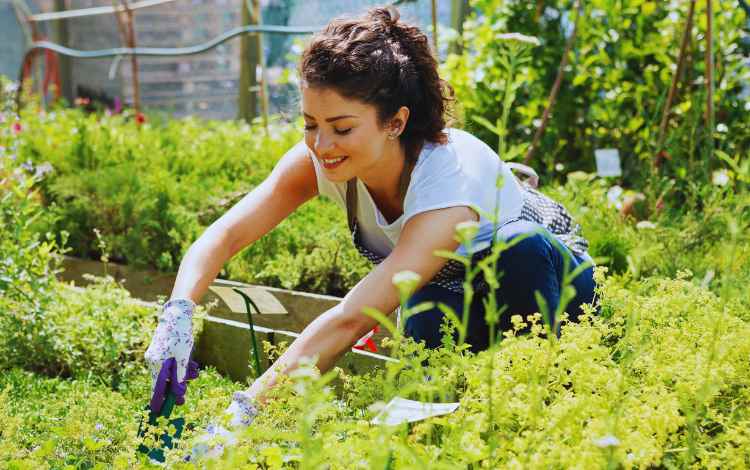
Gardening seems like a typical hobby, but it has proven advantages for many. Spending time communing with nature teaches you to be patient and understand life’s cycle.
Not only are you growing plants, flowers, and produce, but it also provides mental health benefits to you. In this article, you’ll learn the benefits of gardening and how you can begin growing plants yourself.
Gardening Benefits for Mental Health
If you’re not yet into gardening, there are many reasons it’s a hobby that can help you feel good.
Some like planting their favorite flowers and placing them in a combination of soil and compost rich with organic nutrients that provides the right conditions for them to bloom in full splendor.
It can help you in various areas of your mental state as it does for seasoned gardeners.
1. Improves Your Mood
Gardening offers the grower a sense of contentment and inner peace. When an eager gardener decides to focus on the tasks and information needed to grow plants, it helps take away their attention from negative thoughts and emotions.
Gardening gives the grower a sense of purpose, knowing they see tangible results when they focus on growing. Some people even like spending time around plants because it helps ease their stress.
2. Boost Feelings of Connectedness
Gardening provides a space for the grower to perform a meaningful activity.
The grower can feel a connection with the plants they raise and, in turn, grow a sense of purpose and worth.
3. Alleviates Stress and Anxiety
A study concluded that gardening was somehow associated with emotional, spiritual, social, and physical well-being as an additional activity for treating depression.
The study found that it helped ease the stress and anxiety of those who experience gardening.
These are only some of the few benefits of gardening that many can experience.
Various people have been finding peace in growing plants as they feel a sense of duty in what they do.

How to Begin Gardening
Apart from a space to start gardening, you don’t need much to start.
Here are the steps you need to begin your green thumb journey:
Choose The Right Spot to Garden
If you’ve been wondering when to begin gardening, the correct answer is now. You don’t have to worry about future results or even if you don’t know exactly how it works. The important thing is to give yourself a chance to experience gardening right away.
You can learn through research, watching tutorials, and talking to people with experience.
Don’t be afraid to make mistakes. The worst that could happen is that you’ll learn a good lesson you can use next time. Gardening also helps you grow.
Find A Suitable Location
You can choose a location on your property and decide whether you grow plants, flowers, vegetables, or herbs.
To begin a vegetable garden, pick vegetables your family likes to eat.
With flowers, choose whether you want them to bloom for most of the season or if you want short-term blooms.
Start small because the last thing you want is to get overwhelmed. You can always add to the ones you have along the way. Do it at your pace while learning the proper ways to grow and cultivate them.
Gather Your Tools
It’s essential to have the right tools when gardening. If you’re a beginner, you want to be mindful of the necessary equipment. Getting caught up with various tools you see online or offline is easy.
For now, focus on affordable and quality tools. Use the essential trowel, garden hoe, hand cultivator, garden fork, and garden shovel and rake.
Invest in a good pair of gardening gloves, garden scissors, hand pruners for pruning, a garden hose, a watering can, and a soaker hose.
Knowing how to take care of your tools, such as applying oil to prevent blades from rusting, is also vital. Sharpen pruners and scissors with a whetstone. Check if the tools need maintenance or replacement.
Clear the Ground
Clean the garden and eliminate garbage, rocks, stones, and weeds.
If you want to take this to another level, learn about the type of soil you need or the type of gardening you will do. The suitable soil will feed your plants the nutrients they need.
Learn about the potting soil best for your plants. You can choose from clay soul, peaty soil, chalky soil, sandy soil, or loamy soil. If you need more space, you can turn to containers or pots with varieties of plants you can plant in them.
Add the Plants and Fertilize
Transfer the plants onto the ground. How much water to give and the watering frequency depend on the plants you raise.
Vegetables differ from flowers, so knowing when to water them is essential. You can also add fertilizer to add more nutrients to the soil. You can add organic fertilizers like manure.
Remember that you’re still starting. Take it easy because the learning experience and feelings are more important.
In Conclusion
Gardening is helpful for your mental well-being. There are many studies performed to identify its benefits, and many can agree that it alleviates stress and improves the feeling of connectedness.
When beginning a garden as a newbie, you must start small and learn as you go.
Don’t worry so much if you’ve made a mistake. Take the lessons instead and learn patience. You’ll find that gardening can also help you grow as a person.